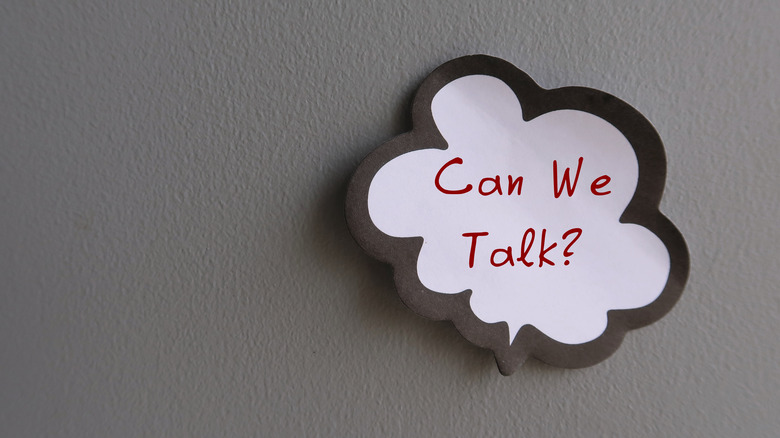How To Reconnect With An Estranged Family Member - Exclusive
As you may know from personal experience or from hearing a loved one's stories about their family disputes, getting along with family members isn't always easy. Sometimes life stresses get in the way and we argue with someone we love, which can leave us unsure of how to repair our relationship. If you have ever experienced a difficult familial conflict, you aren't alone. There are ways that you can begin to restore your relationship if you choose to do so, as well as ways that you can heal from an unhealthy relationship that may be unsafe to continue.
In an exclusive interview with Health Digest, Samantha Quigneaux, a licensed marriage and family therapist (LMFT) and national family program director at Newport Healthcare, shares in-depth information about what being estranged from a family member means and how someone can take steps to reconcile with their loved one. Quigneaux works with adolescents and adults who have experienced trauma and abuse, as well as individuals within the LGBTQ community.
Quigneaux shares that estrangement occurs when family members find themselves unable to communicate effectively or set boundaries in their relationship because of family tension and disagreements. "Family estrangement may be necessary when relationships are unsafe due to traumatic events or abuse. Other times, estrangement may be the result of an argument or misunderstanding," she explains.
Steps you can take to reconnect
A period of self-reflection can be a valuable first step in reconciling with a family member you've disconnected from. Quigneaux shares that before reaching out to communicate, it's helpful to reflect on the reasons why you desire a reconnection and what contributed to the relationship tension in the first place. By reflecting on the initial disagreements, you can better understand what went wrong in your relationship. As your family member may accept or reject your invitation, it's also important to prepare for every possible outcome.
It can sometimes be difficult to put your thoughts into words. To prepare for communication, Quigneaux recommends that you can plan ahead by writing down what you'd like to say to your family member. If you're struggling with the prospect of reaching out for reconnection, you can ask a loved one in your life for guidance. "Ask for help from a trusted friend, safe family member, or your therapist," she advises.
Once you feel prepared enough to reach out, "Proceed slowly and thoughtfully," suggests Quigneaux. "Your reasons for estrangement may be deeply emotional. Allow yourself time and grace to have difficult conversations." Regardless of the outcome, remember that reaching out to someone for reconciliation takes bravery and courage, and is something to be proud of in yourself.
What if your family member isn't ready to reconnect?
Feeling rejected by someone can be painful, especially when it's someone that you care deeply about. According to Healthline, rejection can actually activate the same areas of the brain that physical pain activates, and can stop us from taking potential risks altogether.
Quigneaux points out that when you reach out to an estranged family member, they may not always be ready or willing to reconnect. "Prepare for the possibility that a family member is not ready to reconnect, and how you will work through those feelings of loss and refusal," she says. This refusal to reconcile is a very real possibility, one that you must accept is not within your control. A family member's unwillingness to reconnect can bring up negative emotions inside of you that you will need to work through, such as deep feelings of loss or grief. "Understand that it is okay to acknowledge this pain and grieve this loss, perhaps yet again," Quigneaux shares.
If your invitation to reconnect isn't accepted with open arms, Quigneaux points out that you don't have to cope with the negative feelings alone. "Surround yourself with trusted and emotionally safe loved ones," she encourages. Spending time with friends can help, or you can cope by participating in a hobby or other social activity that brings you joy.
When is reconnection not the best idea?
Sometimes, reuniting with an estranged family member can be more harmful than beneficial. "If you are estranged from a family member because they were physically, mentally, or emotionally abusive to you or posed a threat in your life, explore the root of the desire to reconnect," Quigneaux says. "It may be best to work through this estrangement and trauma with a therapist, rather than reconnect. This way you can come to a place of peace that may not include the estranged family member."
In other cases, it may simply not be the right time to reconnect. According to Quigneaux, "If you are not ready to accept and manage all the different possible scenarios of reconnection, more time to heal and process will be needed." Alternatively, it might not be the best time for your family member to reconnect with you, depending on their current life circumstances. "If you do have knowledge about their current state, consider if it is the right time," advises Quigneaux. She suggests that you look for signs that they have grown emotionally, as well as positive developments in their ability to have a healthy adult relationship.
You can find out more about Samantha Quigneaux by visiting the Newport Healthcare website.



